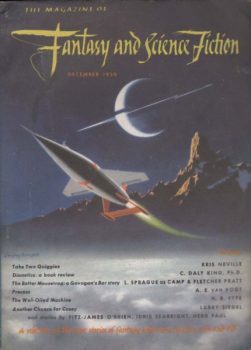A to Z Reviews: “The Well-Oiled Machine,” by H.B. Fyfe
H.B. Fyfe published “The Well-Oiled Machine” in the December 1950 issue of The Magazine of Fantasy and Science Fiction, and the story demonstrates a forward thinking that explores the use of computers and artificial intelligence in the workplace, although in Fyfe’s story, the editor, William Moran (also referred to as Ed, since he is the editor), has a staff of robots rather than networked AIs or computers.
Moran is the editor of Stupendous Stories, a magazine that publishes science fiction adventure stories. As far as the story indicates, Moran is also the only human employee of the company. Before stories get to his desk, a robot known as Sinner writes up synopses (synopses) of the stories for Moran to review. Moran than decides which stories to read based on those briefs and sends the stories to Liar (a linotype robot) to be laid out. Advertising is handled by Adder, the art department is run by Arty, and for good measure, there is a repair robot known as Doc.

As it happens, Moran is much more comfortable dealing with his army of mechanical men than he is with dealing with humans. This begins to become apparent when he asks Liar for advice regarding his girlfriend, Helen, who he completely fails to understand. Liar, whose experience comes solely from the stories that Moran has passed along to him, recites the various plot points of nearly all of the stories as ways for Moran to “win” his girl. Moran knows enough to reject them.
His inability to connect with humans is further displayed when he is visited by Alexander Thorpe, one of his authors. Thorpe is angry because he says his stories have been heavily edited, or even re-written before their publication. Although Moran denies the charge, it becomes clear that Liar is rewriting the stories as he is typesetting them and Moran is unaware of what is happening.
When Helen finally shows up at the office, Moran completely fails on every level, and the robots don’t help by showing signs of jealousy over his erstwhile relationship with Helen, who has come to break up with him after he broke one too many lunch dates. By this time, the reader begins to wonder what Helen ever saw in Moran and is hoping she’ll dump him. Despite his mistreatment of her and the horrors that she’s put into by the various robots, in the end Moran winds up with Helen, which is counterindicated by everything about her personality, but was part of the “happy ending” which was expected for Moran in 1950s science fiction.
The story and Moran’s issues with the host of robots is ripe for updating, but one would hope that Moran could be fleshed out into a more well-rounded character and that Helen could keep the agency which is initially demonstrated in her character.
 Steven H Silver is a twenty-time Hugo Award nominee and was the publisher of the Hugo-nominated fanzine Argentus as well as the editor and publisher of ISFiC Press for eight years. He has also edited books for DAW, NESFA Press, and ZNB. His most recent anthology is Alternate Peace and his novel After Hastings was published in 2020. Steven has chaired the first Midwest Construction, Windycon three times, and the SFWA Nebula Conference six times. He was programming chair for Chicon 2000 and Vice Chair of Chicon 7.
Steven H Silver is a twenty-time Hugo Award nominee and was the publisher of the Hugo-nominated fanzine Argentus as well as the editor and publisher of ISFiC Press for eight years. He has also edited books for DAW, NESFA Press, and ZNB. His most recent anthology is Alternate Peace and his novel After Hastings was published in 2020. Steven has chaired the first Midwest Construction, Windycon three times, and the SFWA Nebula Conference six times. He was programming chair for Chicon 2000 and Vice Chair of Chicon 7.

H . B. Fyfe was, let’s say … well, a Campbellian writer, and not a very good one! (Though probably better than the vaguely similar Everett B. Cole.) I’ll quote one line from my review of his one novel, D-99: “That whole aspect of the book is wildly sexist, in a vaguely Mad Men-ish fashion.” That seems consistent with the Helen/Moran relationship you depict!
Some people thought he was a pseudonym for H. Beam Piper, or perhaps vice-versa, because of the similarity of names.
I think there have been stories doing a better job with some of the ideas in this story. Damon Knight’s “Down There”, for one. Or Sylvia Jacob’s “Slave to Man”, in which a robot turns about to be better at writing porn than humans.